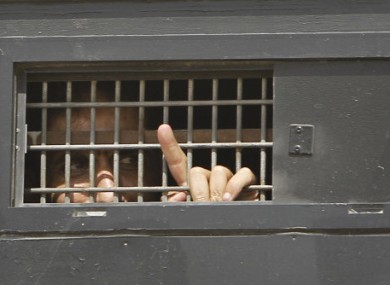Torturing and beating Palestinian prisoners does not end after the investigation part especially for those who are wounded. They suffer greatly when being transferred from the court to any other prison or even to the prison’s clinic by the “Bosta”. They experience excruciating pain that continues for days especially children and women.
The “Bosta” is the Israeli prison transfer vehicle in which the Palestinian prisoners are cuffed all the way to and back from court or clinic while sitting on metal chairs. Some of the prisoners described the blacked-out windows vehicle as a “grave”. Others said that it is in fact “a mobile cell with a metal chair that can barely accommodate one person in a sitting position”.
The story of a young prisoner
Omar Reemawi 15 from Ramallah told the commission of detainees and ex-detainees affairs lawyer about the difficulties he faced while being transported by the Bosta. “I’ve seen a great deal of suffering while being transferred from prison to the court in Ofer by the Bosta” he said.
“I get out from Megiddo prison at 6 a.m. and I stay in the Bosta hands and legs cuffed for 12 hours. Because of my medical condition staying in the Bosta for this long time causes me excruciating pains. They give me a bathroom break once in these 12 hours” he continued.
“At 8 p.m. we arrive to Ramla prison; I spend the night there and in the morning we head to Ofer by the Bosta. In the return journey I faced the same difficult conditions” he added.
Wounded female prisoners
Ex-prisoner Sabreen Abu Sharar said the female prisoners are transported by the Bosta which is considered a source of great pain for wounded prisoners regardless of their age and injury.
Abu Sharar stated that female prisoners suffer more in the transportation process due to their wounds that cannot tolerate the movement of Bosta and the road bumps pointing out that it is a journey of endless suffering.
The Israeli occupation forces released Sabreen Abu Sharar after spending 18 months in Israeli prisons.













